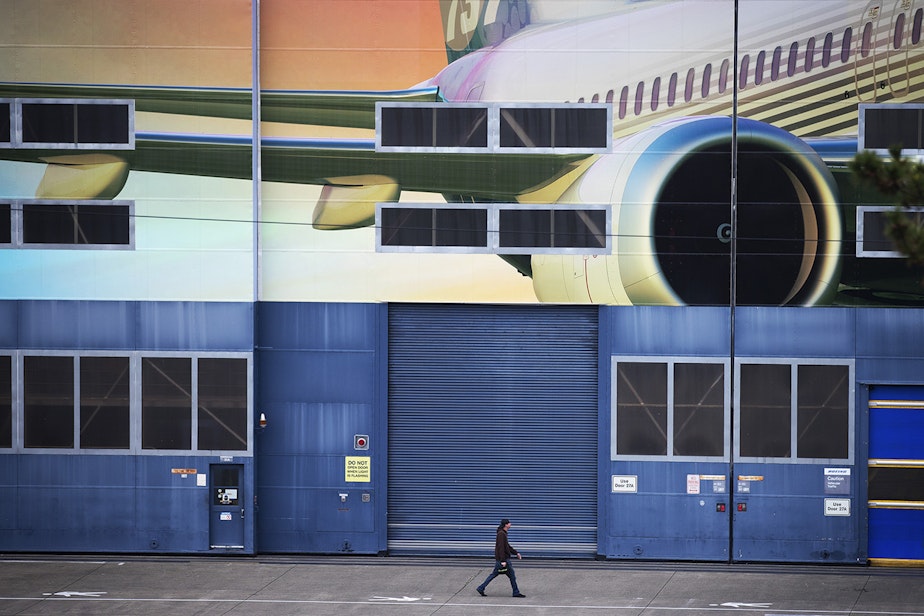What can Seattle's 1970s 'Boeing Bust' teach us about recent tech layoffs?

Since the 1970s, whenever people in the Pacific Northwest lose their jobs en masse, Seattleites ask whether this is the next Boeing Bust.
Looking to Seattle's economic past may offer some wisdom about what's ahead following recent tech layoffs.
Earlier this year, Amazon announced it’s laying off 18,000 workers, including at least 2,300 people in the Seattle area.
Microsoft cut 10,000 workers, with nearly 2,200 of those lay offs in the Seattle area.
Meta cut 11,000 workers and Google cut 12,000 employees. Both have a significant footprint in the Seattle area.
The cuts have stirred up uncertainty and worry, and when an economic shock like this comes to town there’s a certain phrase that’s invoked on TV news, in the papers, and, yes — even your local public radio station.
Hanging over these recent layoff stories is the specter of a past local economic downturn known as the "Boeing Bust."
Sponsored
In 1969, Boeing was the Seattle area's largest employer and the company laid off 60,000 employees in a short period of time. In 1971, Seattle’s unemployment rate hit almost 14%. Meanwhile, the national unemployment rate was closer to 4.5%
"It made Seattle into what people called 'the food stamp capital,' because there were so many people out of work," said Andrew Hedden, associate director of the Harry Bridges Center for Labor Studies at the University of Washington.
Hedden said that there were a few factors that caused the layoffs. When the last 747 rolled off the line in January, there was celebration of the plane’s enduring success.
But when it first took flight in 1969, its fortune looked quite different.
"Boeing had wagered the company on the success of the 747 Jumbo Jet," Hedden said. "They had invested millions of dollars into the project, hired thousands of people, and discovered as the project was coming along, that the global economy was not ready for this plane. The Boeing wasn't receiving orders for the plane like it had expected."
Sponsored
So, that meant layoffs. Then there was the Super Sonic Transport or SST. It was going to be a very fast commercial airplane that was meant to compete with European countries building their own SSTs.
Boeing had been selected to build the SST by the US government. In the 1970s, that funding came to a halt after a long fight in Washington, D.C.
Then President Richard Nixon was a big believer in the SST, but it wasn't enough to convince other senators to continue funding the project.
Nixon And The Sst
Sponsored
The slow starts for the 747 and the SST debacle took a huge bite out of Boeing’s finances. For four years, between 1969 and 1973, the city of Seattle was in dire straits.
Boeing did, however, recover.
By 1973, the company was hiring again. People were declaring the recession over. Nevertheless, the Boeing Bust imprinted itself so powerfully on Seattle’s consciousness that for decades now, whenever the local job market takes a hit, we’ve worried: “Is this the next Boeing Bust?”
Hedden said it could be a useful analogy, as long as we have an accurate representation of the past.
One such misinterpretation is the narrative that private enterprise saved Seattle from unemployment in the 1970s, instead of looking at the federal money routed to Seattle with the help of long-tenured U.S. Senators Warren Magnuson and Henry Jackson, Hedden said.
Sponsored
"There were a lot of self-interested business people and city boosters, who wanted to use Seattle's recovery as a way to advertise the city and its economy," he explained. "So the story that starts to develop is that it was business that dug Seattle out of its economic troubles. In reality, there was a lot more that happened, and it was much more government-driven than it was from the private sector."
Hedden also pointed out that the Boeing Bust era was marked by grassroots organizing that led to the food bank system in the city.
The nature of the economy is boom and bust and there will always be another crisis around the corner. The real lesson of the Boeing Bust, Hedden said, is the need for protections against layoffs.
"The need to protect not just those who are at these companies that are being laid off, but to protect all of those who are in the secondary industries — the service economy — whose jobs really depend on having the bigger companies in the city," he said.





